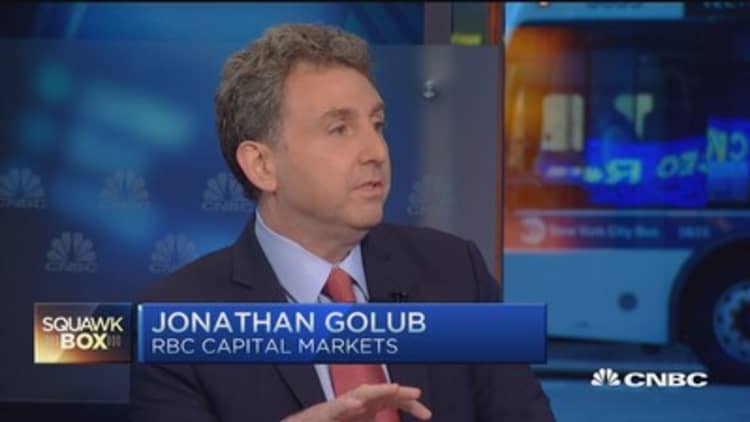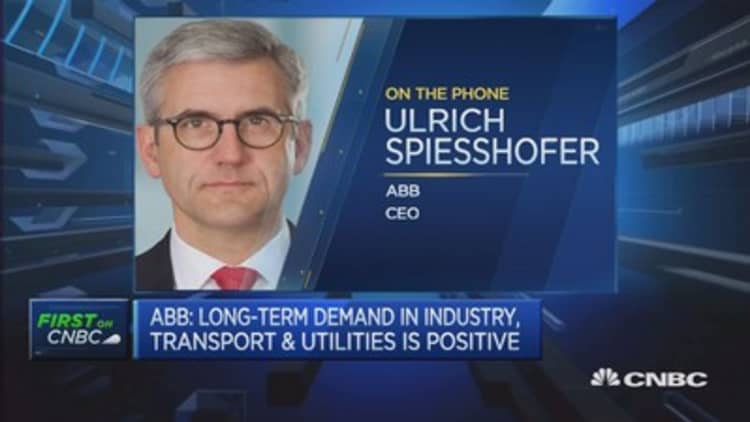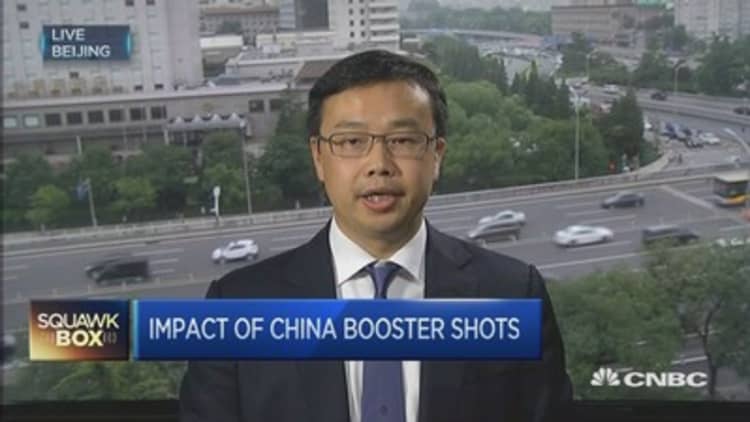


Closely watched investor Ray Dalio is right to sound the alarm on investment in China, RBC Capital Markets' Jonathan Golub said Thursday.
Long time-China bull Dalio wrote to his Bridgewater Associates clients, "Our views about China have changed as a result of recent developments in the stock market."
China's main stock index recently plummeted 30 percent after running up more than 150 percent in about a year. In response, the government imposed a series of restrictions to stem the fall, including a ban on new initial public offerings and a measure preventing large stakeholders from selling their shares.
Bridgewater said it now believes stock market losses to be significant—about 2.2 percent of household sector income and 1.3 percent of GDP—but noted those losses appear to be concentrated among a small percentage of the population.
More important than the direct financial losses are the psychological impacts, Bridgewater concluded, saying, "there are now no safe places to invest and the environment looks riskier, which we would expect to encourage the holding of cash and lessen the marginal effectiveness of easing monetary policy."
Read MoreEl-Erian: China no longer global growth locomotive
"I think this is the canary in the coal mine of more weakness in China," Golub told CNBC's "Squawk Box."
The chief market strategist said business investment is still driving Chinese growth, and that investment must slow because the country has far too much excess capacity.
Chinese policymakers have been attempting to engineer a transition from investment and export-led growth to a consumer-oriented economy.
"They know they need to rebalance that. They've tried to do that by playing around with markets. That doesn't make any sense," Golub said. "They've stopped buying ... foreign sovereigns because they don't have the capital to do it."
Bridgewater Associates later clarified its stance on China in an email to CNBC, saying too much had been made of the shift in its thinking.
"The observations that were made simply noted that falling stock prices have a negative wealth and negative psychological effect. When a classic stock market bubble (supported by unsophisticated investors buying stocks on a lot of margin) bursts there are negative growth effects. When combined with the debt and economic restructurings underway, that will most likely result in slower growth, and more stimulative government policies to offset these downward pressures," Bridgewater's statement said.
"Bridgewater's view that China faces debt and economic restructuring challenges, and that it has the resources and the capable leaders to manage these challenges, remains the same."
Read MoreAltman: This is why China stock crash is a big deal
David Zervos, chief strategist at Jefferies, agreed that Dalio is right to be nervous but said the China story is just getting started.
"I think the reason he's probably nervous, and I would hold this nervousness, is you just don't like to see officials come in and close half the market's stock and say, 'Hey, you can't sell them anymore.' That is going to be for a trader a very difficult period," he told "Squawk Box."
However, he added, investors should expect the Chinese stock market to experience growing pains, and thus far, Chinese officials have been methodical about bringing markets to a nonmarket-based economy.
"At the end of the day, in 10 years, they're going to be a $20 trillion economy and they're not going to have a $4 trillion stock market," he said, referring to the capitalization of the Shenzhen Stock Exchange.


